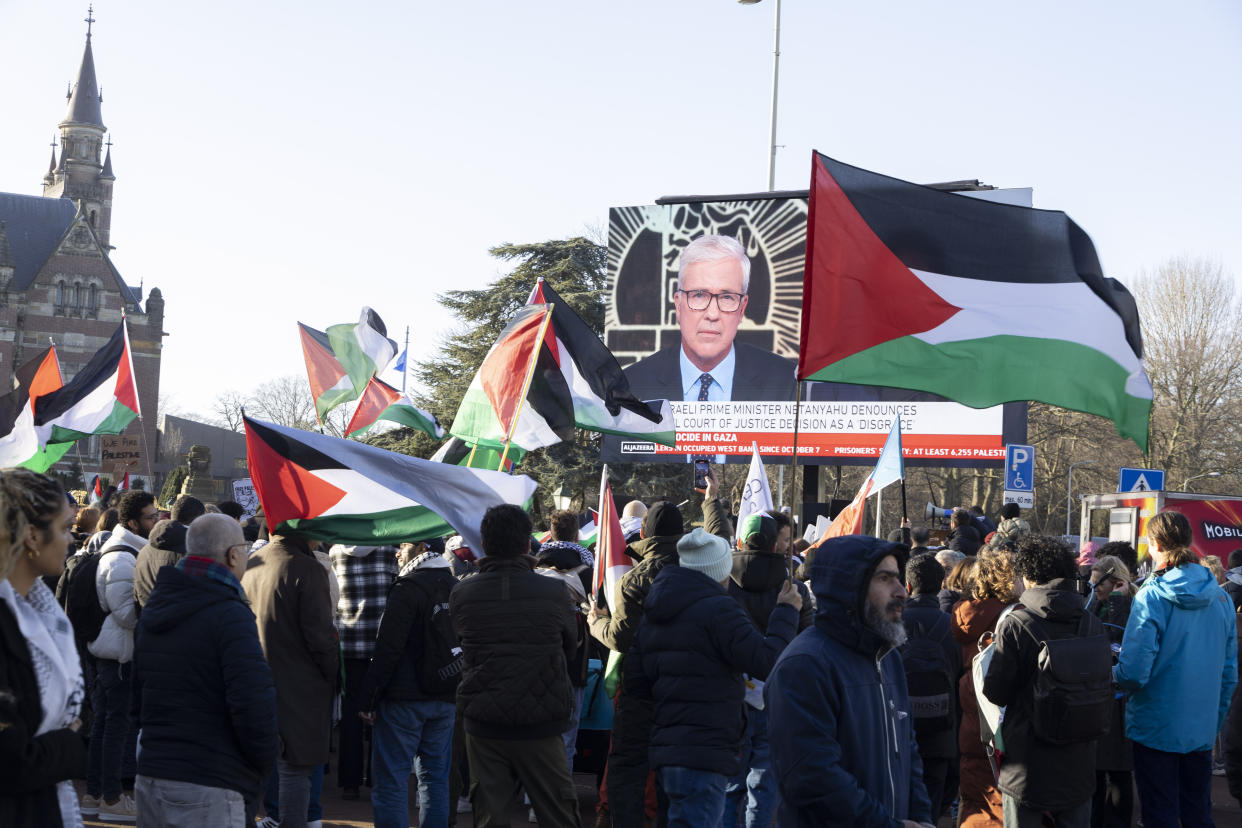International Court of Justice orders Israel to 'take all measures' to prevent genocide

Less than one month after South Africa officially charged Israel with committing genocide against Palestinians in Gaza at the International Court of Justice, the United Nations' highest judicial body this week made its first preliminary ruling in a case that's captivated — and polarized — much of the world.
On Friday, the ICJ released its initial findings that called for Israel to refrain from acts of genocide, allow an increased flow of aid into the besieged Palestinian territory, and "prevent and punish" instances of incitement toward genocide within Israeli society. It also called for the immediate release of the more than one hundred hostages held in Gaza by Hamas militants who were captured in the group's assault on southern Israel on Oct. 7, during which upwards of one thousand Israelis were killed.
While the measures, which the ICJ stressed are "provisional," are essentially non-enforceable, the court has ordered Israel to report back within one month of the ruling to detail what policies it will put in place to follow the various requirements handed down by the judges. Crucially, Friday's report neither confirmed nor denied that Israel was currently committing genocide, nor did it call for an immediate cease-fire between the Israeli military and Hamas fighters. As such, the ruling — backed by the overwhelming majority of the court's judges — falls largely "in line with what most legal experts had forecast," The New York Times reported, with University College London human rights expert Kate Cronin-Furman noting the ICJ had "stuck pretty closely" to a previous provisional ruling regarding Myanmar's alleged genocide against the Rohingya people.
'This is still a good thing'
Friday's ruling was hailed as a "decisive victory for the international rule of law" as well as a "significant milestone" for Palestinians in a statement released by the South African government. Moreover, the ruling shows "there is no credible basis" for Israel's past claims that its conduct in Gaza has been in accordance with international law and genocide treaties.
Ceding that "many will be disappointed" by the lack of a cease-fire demand, Kings College London lecturer in international relations Alonso Gurmendi hailed South Africa's "win," even if it's not the "best win of the century." In particular, Gurmendi explained on X, the ruling made clear that Palestinians "are a protected national group," and, as the South African government noted in its statement, Israel's previous claims that it can continue on its present course of "acting lawfully" has been "disproven," and leaders now "LEGALLY need to change course." Weaknesses aside, "this is still a good thing," Gurmendi concluded.
The West Bank-based Palestinian Authority praised Friday's ruling as well, with Foreign Minister Riad Malki telling The Wall Street Journal that the court's order shows other states have "clear legal obligations to stop Israel’s genocidal war on the Palestinian people in Gaza."
Although the language of the ruling was "not optimal" for Israel, that the court neither called for a cease-fire nor officially declared that Israel was carrying out a genocide means there will likely not be any "political or economic international reactions," Hebrew University human rights expert Barak Medina predicted to the paper.
'Hague Schmague'
Following the court's decision, Israeli Prime Minister Benjamin Netanyahu on X praised the judges for not ordering a cease-fire, which would have violated the country's "fundamental right" to self-defense after Oct. 7. He also rejected South Africa's still-pending allegation of genocide as "not only false" but an "outrageous" accusation that "decent people everywhere" should reject. Netanyahu's office also ordered his government's ministers "not to comment on the ruling" according to Israel's Ha'aretz newspaper. Nevertheless, shortly after the ruling was handed down, the country's far-right, ultra-nationalist national security minister Itamar Ben-Gvir mocked the decision on X, posting "Hague schmague" followed by an Israeli flag.
Friday's ruling is merely the first of what is expected to be a drawn-out legal process over the underlying question of genocide in Gaza, and was made in light of the fact that the "catastrophic humanitarian situation in the Gaza Strip is at serious risk of deteriorating further," ICJ President Judge Joan Donoghue explained.
According to The Washington Post, a final verdict on whether or not Israel has indeed carried out a genocide already "could take years."

